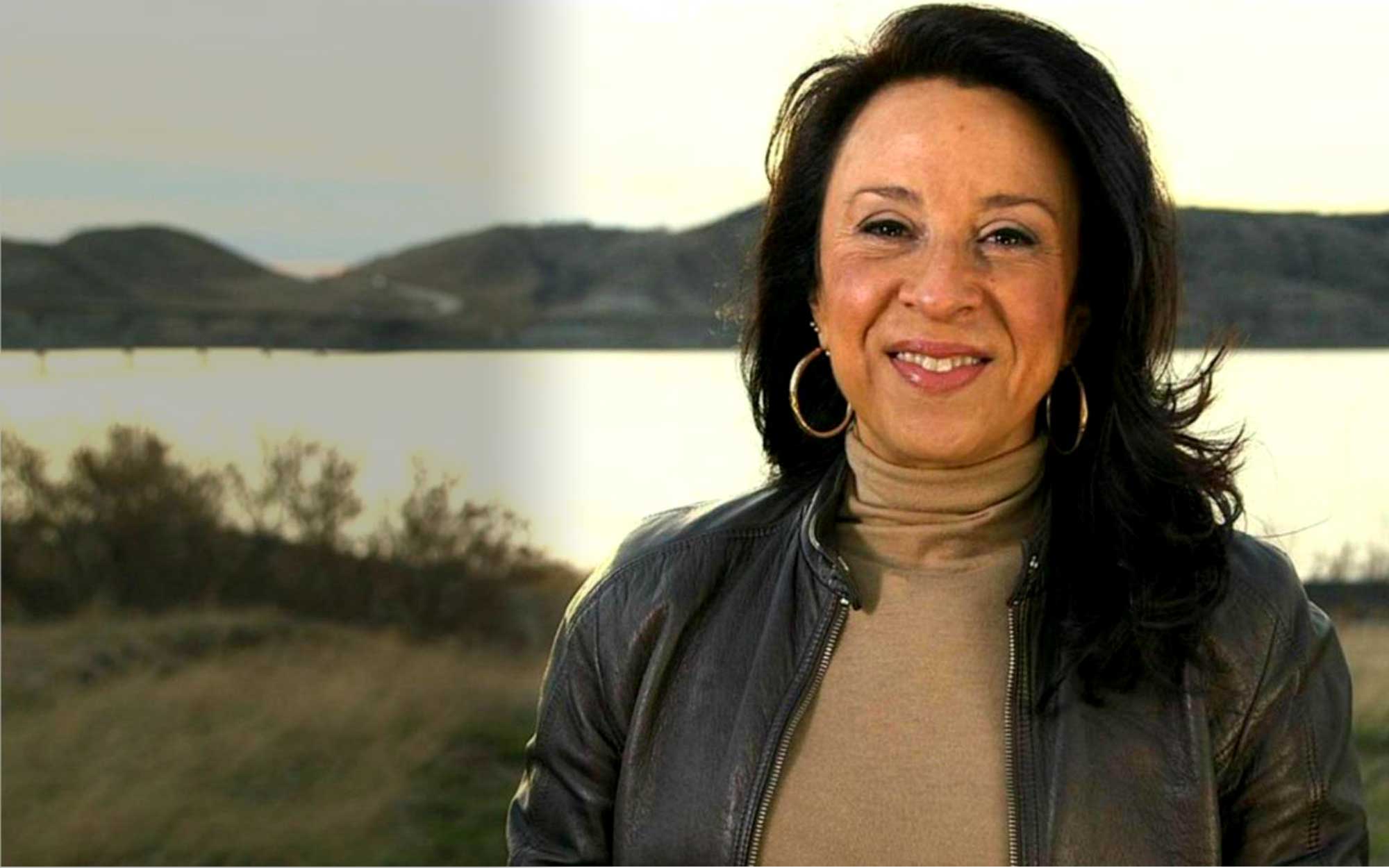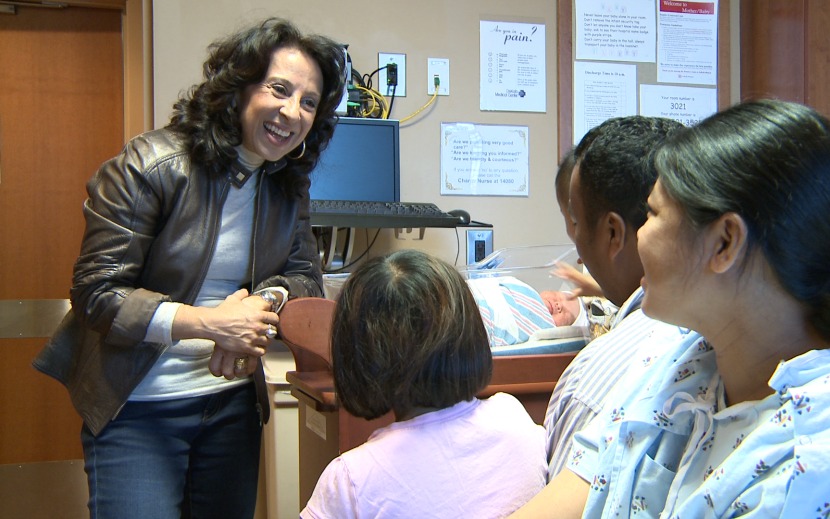Maria Hinojosa on Telling America’s Stories, Yours Included

Mexican-American Mash-Up Maria Hinojosa, host and executive producer of Latino USA on NPR and president of Futuro Media Group, in Harlem, New York, is the stuff of journalism legend. Her newest production, America By The Numbers, on PBS, details the changing demographic shift in America, one beautifully detailed story at a time. She sat down with The Mash-Up Americans to talk about the power of owning your (possibly accented) voice, why she became an American citizen, and being a New Yorker above all.
You can do anything in your career. Why America By The Numbers, and why now?
Back in 2010, when we came up with the idea, we really felt like our country was on the cusp of something. Obama had been elected, the census was being released, and everybody could feel things were changing. I’ve been a part of this demographic change — I was born in Mexico, raised in the U.S., and now I have two kids in this country with my husband who is also an immigrant. I am part and parcel of the change in America. And nobody was talking about it explicitly the way we are.
There was also another element. Once we decided we were going to talk about demographics and this huge moment in American history, I worried that it if I presented it to PBS, the response would be, “Oh Maria, here you go again. All you want to do is talk about people of color and Latinos.” But when you add numbers and data that are irrefutable, it becomes easier for us to do the kind of journalism we want to do without being accused of having a diversity agenda. This isn’t my agenda. This is the future.

What were your beginnings?
I was born in Mexico City. The University of Chicago offered my dad, who is a medical doctor by training, a job. Because of the political dynamic in Mexico, we moved, even though we never thought we would leave Mexico. We were the first ones in the family to go to El Norte. I was raised in Hyde Park, Chicago, with lots of Jewish families. But every weekend we were in Pilsen. We were very attached to the Mexican community in Chicago, and we returned to Mexico all the time.
As Mexican immigrants who were educated, my family understand the importance of media and journalism and freedom and freedom of the press. We were big consumers of the evening news and the morning shows. The radio was on all the time. But we never saw our realities being told. And because I was always a border crosser, from the U.S. to Mexico to Hyde Park to Pilsen, I had always seen multiple realities. I felt like there was a story that needed to be told about this. At first I wanted to become an actress, but those doors were completely closed to me because there were no actors who looked or sounded like me. In college, I got to college radio and that changed everything for me in terms of me owning my voice. That’s when I began to understand that when you have this whole other experience in this country, it can be a powerful entry into stories. Those were the humble beginnings.
Diversity isn’t one of those things that’s a good idea, but only if you can swing it. You have to be committed.
Do you identify primarily as a Latina, a journalist, or a Latina journalist?
I am a journalist, I am a Latina, and I am Latina journalist. I don’t ever take off my hat and stop being a Latina, or stop thinking that I was born in Mexico. It’s part and parcel of who I am. At my core, I’m a journalist. That’s what I love to do.
Once I understood it, being a Latina gave me power in the newsroom. Which is ironic, because frankly, having been the first Latina in many places, I didn’t feel like I had power. But the fact that I am Latina gives me this other dimension as a journalist. I want journalists who are complex thinkers and have had complex experiences in their life. When I’m consuming media, I want it to come from somebody who has deep experience and deep thought. So the fact that I’m a Latina and Mexican born and became a U.S. citizen and married a man from the Dominican Republic and my kids are US born Latinos — it informs my journalism.
A lot has been written lately about Serial and white journalists being interlopers when they cover immigrant or minority issues. Do you think a white person can cover a community of color?
The role of a journalist is to be highly aware of themselves and of their surroundings and act with humility. I try to operate in the service of the characters in the story I’m reporting on. Can other journalists have those same traits? Who are not Latinas, immigrants, or people of color? Can they also go deep into a community, and not helicopter over, but get in at the bottom of a story? Yes! Absolutely. However, I do think that we as a country have to have a conversation about who decides what objectivity and subjectivity is, and who gets to decide what story is important. That’s why I created my own company and why I am the executive producer. But my company works as a diverse collective. It’s not just what Maria wants. We approach stories from a very different place and perspective than most mainstream newsrooms. It’s not like I didn’t try to do our stories in other places where I worked!
So right now, the fascinating thing is that journalists, and diverse journalists at the highest levels of “white mainstream journalism,” are beginning to push this conversation. Twenty years ago this wasn’t even a conversation to be had. Editors were like, “We know what objectivity is.” Well, no. Do you what does objectivity looks like in a very complicated USA?
How have you built such a diverse team around you?
It’s a challenge in this business. Being a journalist, period, is hard. And to be a journalist of color is really challenging. You may have to push a little bit more and broaden your circles in how you find talent, but talent exists. It’s not like we say, “We’re not going to hire white men.” But we hire people who understand the notion of cultural competency and who want to give voice to people who usually don’t have voice. We want people who come in owning their own stories and who they are. Diversity isn’t one of those things that’s a good idea, but only if you can swing it. You have to be committed and hyper aware of representing diversity.
One identity does not supercede the other. Above all, we’re New Yorkers.
Being a journalist kind of nudged you into becoming an American citizen, didn’t it?
My citizenship process began in the late 1980s. It took about two years. I was already a journalist and was traveling a lot internationally. I had been reporting out of Central America and Cuba with my green card. The fact that I had a green card made it clear I was not 100% a part of this country, and I wanted to protect myself. Like, listen, one day you’re going to be flying back from fill-in-the-blank country and you’re going to get to immigration and they’re going to say, “Nah.”
As I was got older, I also understood the importance of owning my American identity, by saying “I’m American, too.” It was hard to do, because it came with some shame. My whole family was born in Mexico. Most of us have become citizens, but some have not. In Mexico, to decide to become an American is turning your back on your homeland. But I was reporting on political issues, voters, and political empowerment, and I thought to myself that I need to become an American and live up to my civic duty in this country. Now, I’m not only good, I’m great with being an American.
How do you talk to your kids about being mixed in America?
It’s not so much that we talk about it explicitly, though we have occasionally. We have always divided our time between the Dominican Republic and Mexico. One identity does not supercede the other. Above all, we’re New Yorkers.
I think about that a lot with my son, who’s mixed Asian and Latino. That New York is really where we fit in and our primary identity. Maybe here, it’s less of an issue because you physically stand out less.
Yes. And you can’t beat your kids over the head with their identity, because it’s just part and parcel of who they are, and how life is. I think our kids are going to identify in a different way. I grew up at a time when segregation was real. My son doesn’t have that experience, but he does know what stop and frisk looks like. He understands Trayvon Martin and Ferguson. He understands that he’s not a disenfranchised black man, but as a Latino that there could be particular questions asked of him. The conversation around identity is very fluid. When you live it organically and authentically, your kids will pick it up and recognize it and be proud of their heritage.
Living organically and authentically! It’s hard to do! And it’s something that I feel guilty about all the time. Like, are we giving enough of our culture to our kids? Or are we forcing it? It’s not like my husband and I speak Spanish or Korean all the time at home.
We’re 100% American, that’s a given. The real question is how are we going to keep hold to our cultural roots, which makes all of us richer as a country?
These are core issues. As a parent I’m like, “How do I parent more as a traditional Mexican mom but also a feminist American mom?” What are they going to lose? What have I not been able to give them in terms of traditions? Frankly I feel like this is one of the central conversations of our time. And yes, there’s a lot of guilt. Like oh my god, what’s going to happen if we lose this thing.
But when we flip the narrative and look at what we are doing, rather than what we’re not doing, it’s much more positive. My daughter isn’t 100% fluent in Spanish, and that’s an issue, but is she proud of her name? Oh hell yes. Does she know her name gives her a particular identity and is she proud of it? Yes. My son doesn’t go around introducing himself and saying “Hey, I’m Mexican.” But in his college dorm he hung posters of indigenous people in Mexico. I don’t have an answer, because it’s something I think about a lot. We all have a little bit of shame and guilt. I’m just hoping that people like you and me can push the conversation and put it out in the open, because it creates tremendous anxiety.
So much of the mainstream conversation about first and second generation immigrant children is dominated by questions of how these “minorities” are going to fit in and become Americans. Well, we’re 100% American, that’s a given. The real question is how are we going to keep hold to our cultural roots, which makes all of us richer as a country? I don’t think we’re quite there yet.
When will we get there?
We have to realize that the numbers do not define the situation, in terms of control of the media and in terms of control of the massive financial system in our country. That’s not going to change just because we have a majority non-white America. The story of the next several decades is not how we are going to get a slice of the pie, it’s we’re throwing the old one out and creating a new pie. It’s not determined yet what it will look like. But it’s an phenomenal time to live in, so let’s talk ownership of the conversation.



![[Image Description: Photo of an Asian American woman at a desk. She is looking at her laptop computer and there is a microphone in front of her. She has headphones over her ears and is wearing a mask over her nose attached to a gray tube.] Photo Courtesy of Alice Wong](https://www.mashupamericans.com/wp-content/uploads/2021/02/Standard-New-Site-Feature-Image-Size-1140-x-400-1-248x194.jpg)

